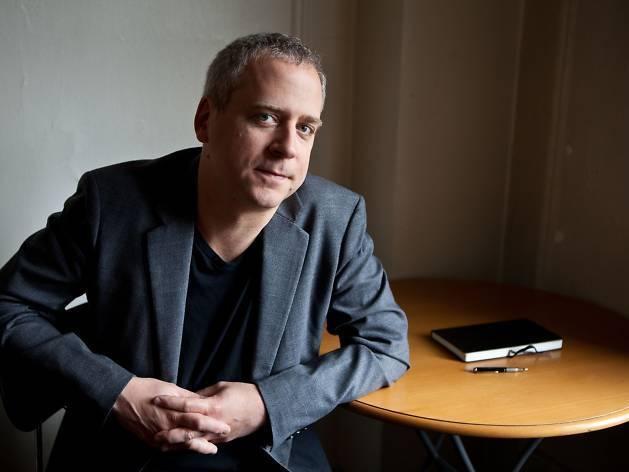Denk and Academy bring vitality and finesse to imaginative program at Arsht

Pianist Jeremy Denk performed with the Academy of St. Martin in the Fields Saturday night at the Arsht Center in Miami.
The Academy of St Martin in the Fields is one of the world’s finest chamber orchestras. Pianist Jeremy Denk is one of the most interpretively audacious and musically rigorous artists on the concert stage today. Put Denk and the London-based ensemble together and you have the formula for an outstanding concert.
That is exactly what happened Saturday night when Denk and the Academy played at the Arsht Center.
Although Mozart’s Piano Concerto No. 12 in A Major is not played as often as his last eight concertos for the instrument, it is a delightful work that is rich in thematic invention and interplay of solo and orchestral forces.
Under the direction of concertmaster Tomo Keller (who led from his first chair position), the orchestra’s introductory tutti could have benefited from less heaviness but, with his first entrance, Denk set the performance back on track. His pianistic attack was vigorous without sounding overly percussive and the he brought a light touch to the shaping of melodic lines and filigree. The dialogues between piano and orchestra were given chamber-like integration. Denk’s reading of the first movement cadenza was marked by nuanced dynamics and nimble articulation. With Denk setting the pulse, the orchestral postlude in the first movement was twice as lively as the introduction.
Denk delved deep into the subtext beneath the grace notes of the Andante, achieving an almost Beethovenesque eloquence. He took the final Allegretto at a fast pace while maintaining precision and sensitivity of touch with rapid-fire exchanges between soloist and ensemble deftly achieved.
Responding to a standing ovation for his outstanding Mozart performance, Denk offered an encore of his hybrid honky-tonk piano version of the Pilgrims’ Chorus from Wagner’s Tannhäuser. After initially playing the familiar melody in a straightforward manner, he morphed into a boogie-woogie jazz riff that really swung and may have been partly improvisatory. Denk’s modernist take on Wagner was a fine showcase for his versatility, and both he and most of the audience seemed to enjoy letting their hair down.
Denk returned following intermission for a rare performance of Benjamin Britten’s Young Apollo. Written in 1939, this short score was the first of Britten’s works to be premiered during his wartime North American sojourn. Scored for piano, string quartet and string orchestra, the score is cast in a neo-Baroque, concerto grosso mode.
With Keller leading the four string players in front of the piano, the terse opening figurations were sharp and emphatic. Denk’s bouncy keyboard role had finesse as well high energy and spot-on timing. The quartet and ensemble themes turned more lyrical before a wild dash to the conclusion. This brief (seven minute) score by the young Britten combines spicy harmonics with rigorous contrapuntal writing and proved an audience pleaser.
Admirably eschewing warhorses, the orchestral offerings were likewise scores rarely encountered in the concert hall.
Albinoni’s Concerto a cinque No. 5 in A minor was the opening work on the Academy’s first London concert in 1959. (The ensemble’s legendary founder Sir Neville Marriner led while playing violin in the first chair during those initial performances.) Albinoni’s work was just as entrancing an opener on Saturday night. The 21 string players’ tight unison ensemble and silken sonority immediately riveted attention. Keller’s singing tone highlighted the work’s slow middle section as well as the spirited finale.
C.P.E. Bach was the most musically imaginative of the composer sons of Johann Sebastian Bach. His Symphony in E-flat Major displays artistic developments that were ahead of their 18th century era. The score opens with angular string motifs while two horns, at times, add their own counter figurations. The Presto finale is almost a hornpipe and the robust playing had appropriate lightness in its step.
Haydn’s early symphonies are rarely programmed. Therefore the Academy’s performance of his Symphony No. 44 in E minor was all the more welcome. Despite its minor key and the subtitle “Trauer” (Mourning), the work is an invigorating four-movement display of Haydn’s command of orchestration and memorable themes.
The players offered modern orchestral Haydn, played with the full sonority of contenporary instruments, yet kept within the stylistic niceties of the classical tradition. The outer movements had plenty of propulsive energy, definitely not Papa Haydn of the powdered wig variety. A spacious Minuet and canon and long spun Adagio were shaped with just the right measure of aristocratic charm and wit.
Keller and the ensemble played an arrangement of Londonderry Air (Danny Boy) as an encore that displayed the strings’ richness but turned to tenderness on the second verse. Before the musicians left the stage, they hugged and congratulated each other on a job well done—a rare sight in American concert halls.
The Chicago Symphony Orchestra under Riccardo Muti plays Tchaikovsky’s Symphony No. 5 and Rimsky-Korsakov’s Sheherazade 8 p.m. Wednesday at the Arsht Center in Miami. arshtcenter.org; 305-949-6722.
Posted in Performances
One Response to “Denk and Academy bring vitality and finesse to imaginative program at Arsht”
Leave a Comment
Sun Feb 24, 2019
at 11:51 am
1 Comment







Posted Feb 25, 2019 at 4:26 pm by Heide Rice
Sorry, but as a professionally trained musician who loves Wagner‘s music, I found Denk‘s rag version of Tannhäuser highly offensive to me, the great music on the rest of the program, the orchestra and audience. It would have been more appropriate, if at all, at a private after-concert party after everyone had had a few drinks. BTW I also didn‘t find his Mozart the most sublime I‘ve ever heard and thought the orchestra did it far more justice than he did.